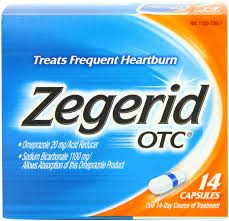Antacid medications like Zegerid are associated with nephritis (kidney inflammation) and chronic renal disease. These diseases can permanently damage the kidneys and cause kidney failure.
What You Can Do & How We Can Help
The Schmidt Firm, PLLC is currently accepting Zegerid induced injury cases in all 50 states. If you or somebody you know has been diagnosed with kidney failure, you should contact our lawyers immediately for a free case consultation. Please use the form below to contact our Defective Drug Litigation Group or call toll free 24 hours a day at (866) 920-0753.
Overview
The anti-heartburn drug Zegerid contains sodium bicarbonate and omeprazole, a proton-pump inhibitor (PPI) that has been on the market since 1989 under the brand-name Prilosec.
Zegerid and Kidney Failure
Zegerid and other PPIs have been linked to higher rates of several kidney diseases that can cause kidney failure, including nephritis and chronic kidney disease. It is not clear why PPIs are associated with kidney problems, but it may have something to do with repeated bouts of inflammation (nephritis) or low magnesium levels.
In the 1990s, omperazole was linked to 17 case reports of nephritis. This sudden hypersensitivity reaction causes inflammation and swelling in the spaces between tubules inside the kidneys. In December 2014, the FDA added acute interstitial nephritis to the label on Zegerid and other PPIs.
In February 2016, a study found that people who used PPIs every day were 20-50% more likely to develop kidney disease. Another study published by Canadian researchers linked PPIs with a tripled increased risk of nephritis and a 2.5-fold increased risk of acute kidney injury. Both of these conditions can cause kidney failure.
Zegerid Linked to 96% Increased Risk of Kidney Failure
In April 2016, a study by the Journal of the American Society of Nephrology investigated kidney side effect of PPIs like Zegerid and non-PPI heartburn drugs in the H2-blocker class (Pepcid, Zantac, etc.). They found that people on PPIs had a 96% increased risk of kidney failure and a 26% increased risk of chronic kidney disease
The conclusions were based on 5 years of data on nearly 200,000 people, including 170,000 on PPIs and 20,000 on H2-blockers. The researchers concluded:
- 15% of PPI users were diagnosed with kidney disease vs. 11% of H2-receptor users
- 0.2% of study participants developed kidney failure, but it was twice as common in PPI users
- 3X increased risk of kidney failure was seen in people who used PPIs for 1-2 years vs. 1 month or less
According to the author of the study, Dr. Ziyad Al-Aly:
“I think people see these medications at the drug store and assume they’re completely safe. But there’s growing evidence they’re not as safe as we’ve thought. [Patients should] use PPIs only when it is medically necessary, and should limit duration of exposure to the minimum necessary to treat the underlying medical condition.”
What is Kidney Failure?
Kidney failure is the last stage of renal disease. It occurs when the kidneys are unable to clean the blood, make urine, produce hormones, or perform other functions the body needs to survive.
Symptoms of Kidney Failure
People with end-stage kidney failure develop uremia, a condition in which toxins and excess wastes accumulate in the blood. This can cause fatigue, weakness, vomiting, chronic pain, seizures, coma (unconsciousness), and even death. In the early stages of kidney failure, symptoms may include:
- Persistent itching
- Muscle cramps or twitching
- Nausea and vomiting
- Loss of appetite and weight-loss
- Swelling in the feet and ankles
- Changes in urination (excessive amounts or not enough)
- Shortness of breath
- Trouble sleeping
Treatment for Kidney Failure
The kidneys can heal from minor damage, but when the stop working altogether the only treatments are dialysis or a kidney transplant. Patients on dialysis must undergo intensive medical care to clean their blood. An organ transplant can cure kidney failure, but donor organs are rare and patients will need to take anti-rejection medications.
Do I have a Zegerid Lawsuit?
The Schmidt Firm, PLLC is currently accepting Zegerid induced injury cases in all 50 states. If you or somebody you know has been diagnosed with kidney failure, you should contact our lawyers immediately for a free case consultation. Please use the form below to contact our Defective Drug Litigation Group or call toll free 24 hours a day at (866) 920-0753.
Attention Lawyers: We consider a referral from another law firm to be one of the greatest compliments. If your firm is interested in referring us a case or for us to send you a list of previous award judgments and/or average referral fees, please visit the Lawyer Referral section of our website.


 The Schmidt Firm, PLLC has been recognized as one of the nation’s leading plaintiffs' law firms and handles cases in all 50 states. We are very proud of our legal achievements, but equally self-respecting of our firm's reputation for providing personal attention to each and every client we represent.
The Schmidt Firm, PLLC has been recognized as one of the nation’s leading plaintiffs' law firms and handles cases in all 50 states. We are very proud of our legal achievements, but equally self-respecting of our firm's reputation for providing personal attention to each and every client we represent.

